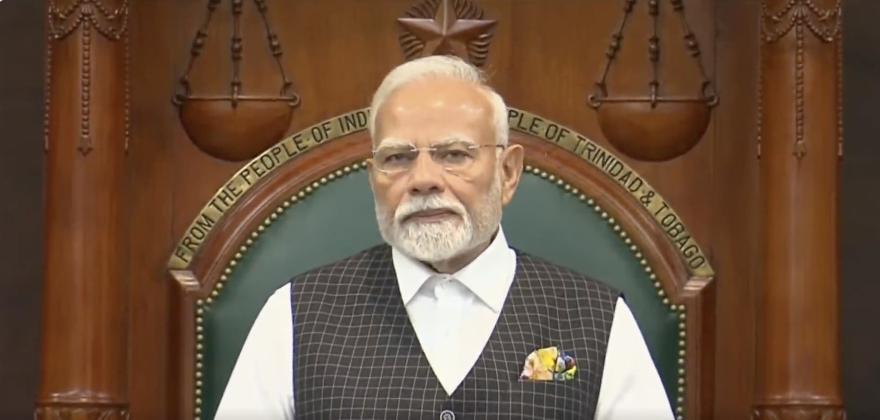
Glad to see so many women MPs: PM in Trinidad & Tobago parliament
Prime Minister Narendra Modi recently addressed the joint assembly of Trinidad and Tobago’s parliament, where he expressed his delight at seeing a significant number of women members present. His statement was a testament to the growing importance of women’s representation in politics worldwide.
During his address, PM Modi emphasized the significance of women’s participation in nation-building, stating that the respect for women is deeply rooted in Indian culture. He also highlighted India’s efforts to strengthen women and empower them to build a modern India.
The Prime Minister’s words echoed the sentiments of many around the world who believe that women’s participation is crucial for a society’s progress. In recent years, there has been a growing trend towards increasing women’s representation in politics globally. This shift is not limited to any particular region or country, but is a worldwide phenomenon.
In India, for instance, the number of women MPs has been steadily increasing over the years. In the 17th Lok Sabha, which was elected in 2019, the number of women MPs rose to 78, accounting for 14.1% of the total strength of the House. This is a significant increase from the 1996-2004 period, when the number of women MPs was just 42.
The growing representation of women in Indian politics is not limited to the Lok Sabha. In the 2020 Delhi Assembly elections, the number of women MLAs increased to 22, accounting for 14.3% of the total strength of the House. Similarly, the number of women MLAs in the 2019 Maharashtra Assembly elections was 57, accounting for 15.4% of the total strength of the House.
The increasing representation of women in Indian politics is a significant development, as it ensures that women’s voices are heard and their perspectives are taken into account. Women’s participation in politics can lead to a more inclusive and equitable society, where the needs and concerns of all sections of society are taken into account.
PM Modi’s statement in the Trinidad and Tobago parliament was also significant, as it highlighted India’s efforts to empower women and strengthen them to build a modern India. The Prime Minister’s emphasis on the importance of women’s participation in nation-building is a reflection of the Indian government’s commitment to promoting women’s empowerment.
In recent years, the Indian government has taken several initiatives to empower women and promote their participation in various domains. These initiatives include the Beti Bachao, Beti Padhao (Save the Girl Child, Educate the Girl Child) scheme, which aims to address gender imbalance and promote girls’ education. The government has also launched several schemes to promote women’s participation in entrepreneurship, such as the Start-Up India, Stand-Up India initiative.
The Indian government has also taken steps to promote women’s participation in politics. The Electoral Commission of India has taken several initiatives to promote women’s participation in elections, including the introduction of a 33% reservation for women in local bodies. The government has also launched several schemes to promote women’s participation in politics, such as the Sarva Shiksha Abhiyan (Education for All) scheme, which aims to promote girls’ education and empower them to participate in politics.
In conclusion, PM Modi’s statement in the Trinidad and Tobago parliament was significant, as it highlighted India’s efforts to empower women and strengthen them to build a modern India. The Prime Minister’s emphasis on the importance of women’s participation in nation-building is a reflection of the Indian government’s commitment to promoting women’s empowerment. The growing representation of women in Indian politics is a significant development, as it ensures that women’s voices are heard and their perspectives are taken into account.



